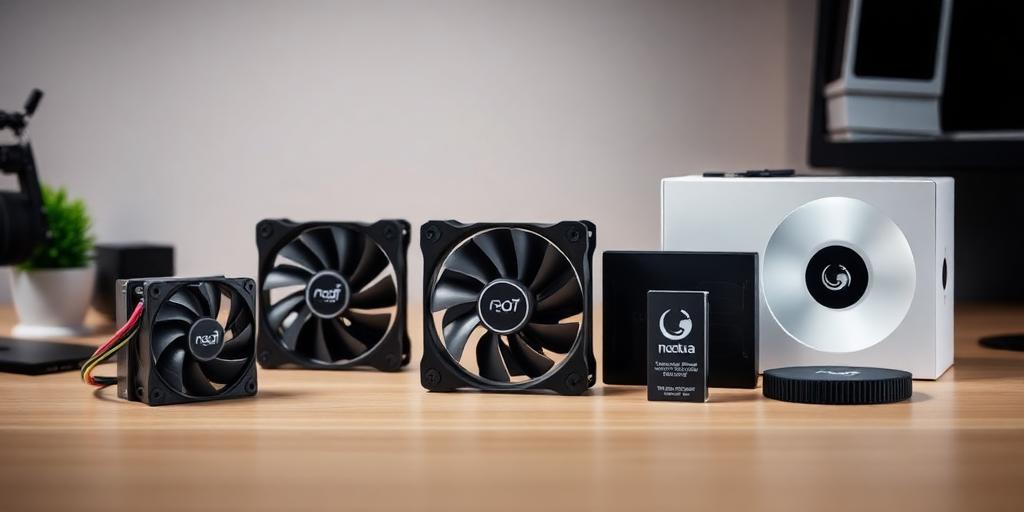Building a silent PC is a rewarding endeavor for those who value a distraction-free computing experience. Whether you're a gamer, content creator, or simply someone who appreciates peace and quiet, a silent PC can significantly enhance your productivity and enjoyment. This guide explores the key components and tips for building a PC that minimizes noise without compromising performance.
Understanding the Sources of PC Noise
Before diving into component selection, it's crucial to understand where PC noise originates:
- Fans: These are the primary culprits, used for cooling the CPU, GPU, and case.
- Hard Drives: Traditional mechanical hard drives (HDDs) produce noise from spinning platters and moving heads.
- AIO and Custom liquid coolers: While they are quieter than fan-based coolers, they can still produce noise from their pumps and fans.
- Power Supply: The PSU fan can contribute to overall system noise.
- Vibrations: Components like fans and HDDs can cause vibrations that amplify noise.
Key Components for a Silent PC
CPU Cooler:
- Noctua NH-D15: A top-tier air cooler known for its exceptional cooling performance and quiet operation. Its large heatsink and dual fans dissipate heat efficiently at low RPMs.
- be quiet! Dark Rock Pro 4: Another excellent air cooler that rivals the Noctua in performance and silence. It features a unique fin design and decoupled fan mounts to minimize vibration.
- Liquid Coolers (AIOs): While seemingly counterintuitive, high-quality AIOs with low-noise pumps and fans can be very quiet. Look for models like the Corsair iCUE H115i Elite Capellix or the NZXT Kraken Z63 with customizable fan curves.
GPU (Graphics Card):
- Passive Cooling: For low to mid-range GPUs, consider passively cooled models like the ASUS GeForce GT 710 Silent. These cards have large heatsinks and no fans, resulting in completely silent operation.
- Custom Fan Profiles: For high-performance GPUs, adjust the fan curve using software like MSI Afterburner or EVGA Precision X1. Set a conservative fan profile that keeps the GPU cool enough without excessive noise. Some GPUs also feature a "0dB" mode, where the fans only spin up under heavy load.
Case:
- Sound Dampening: Choose a case with built-in sound dampening material on the side panels, front panel, and top panel. Cases like the be quiet! Silent Base 802 or the Fractal Design Define R6 are excellent choices.
- Solid Construction: A well-built case with minimal gaps and vibrations will further reduce noise. Look for cases with thick steel construction and secure panel mounting mechanisms.
Storage:
- SSDs (Solid State Drives): Replace traditional HDDs with SSDs. SSDs have no moving parts and are completely silent. Opt for NVMe SSDs for faster performance and reduced latency.
Power Supply (PSU):
- Fanless PSUs: Consider a fanless PSU for completely silent operation. Seasonic and fanless power supplies are well-regarded options.
- High Efficiency: Choose an 80+ Gold or Platinum certified PSU. These PSUs operate more efficiently, producing less heat and reducing the need for aggressive fan cooling. Many PSUs also feature a semi-passive mode, where the fan only spins up under high load.
Case Fans:
- Low-Noise Fans: If case fans are necessary, choose models designed for quiet operation. Noctua and be quiet! offer a range of low-noise fans with optimized blade designs and vibration-dampening features.
- Fan Controllers: Use a fan controller to adjust fan speeds based on temperature. This allows you to keep the fans running at minimal RPMs when the system is idle or under light load.
Tips for Optimizing Silence
- Cable Management: Proper cable management improves airflow, which can reduce the need for high fan speeds.
- Component Placement: Arrange components to minimize heat buildup and optimize airflow. For example, ensure that the CPU cooler has adequate clearance and that the GPU is not suffocated by other components.
- Vibration Dampening: Use rubber mounts or vibration-dampening pads for fans and HDDs to reduce noise caused by vibrations.
- Dust Filters: Install dust filters on case intakes to prevent dust buildup, which can impede airflow and increase fan noise.
- Regular Maintenance: Clean your PC regularly to remove dust and ensure that fans are operating efficiently.
Conclusion
Building a silent PC requires careful component selection and attention to detail. By choosing the right components and implementing effective noise reduction techniques, you can create a system that delivers exceptional performance without the distraction of excessive noise. Whether you're working, gaming, or simply browsing the web, a silent PC offers a more enjoyable and immersive computing experience.









